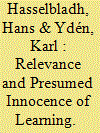| Srl | Item |
| 1 |
ID:
185261


|
|
|
|
|
| Summary/Abstract |
Responding to Soeters and Talbot and Fischer, we clarify our position that learning in military organizations is highly contingent on established organizational frameworks, vocabularies, and understandings and constrained by existing power relations. The danger present in military operations increases the importance of minimizing internal frictions and constrains local experimentation and the application of different solutions. Thus, while there is learning in military organizations, the latter are less prone than large, civilian organizations to venture into the use of new and unproven solutions. The present debate about learning in military organization reflects the different basic assumptions about formal organizations in management studies as opposed to the field of organizational sociology.
|
|
|
|
|
|
|
|
|
|
|
|
|
|
|
|
| 2 |
ID:
166587


|
|
|
|
|
| Summary/Abstract |
The past decade has seen substantial shifts in Swedish security policy and major change in the domestic debate about NATO. For the first time, all of the right-of-centre “alliance parties” are calling for a full NATO membership, and popular support for NATO has increased. Yet public opinion contains ambiguities and paradoxes that complicate the picture. At the same time as support for NATO has increased, the public is overwhelmingly for continued military non-alignment. Drawing on previous research, longitudinal data from national surveys, and other sources on defence and security issues, this article aims to increase our understanding of the development and change in Swedish public opinion on NATO. A key argument is that Erving Goffman’s theatre metaphor, combined with neo-institutional decoupling theory, to a large degree can help understand the public opinion paradox.
|
|
|
|
|
|
|
|
|
|
|
|
|
|
|
|